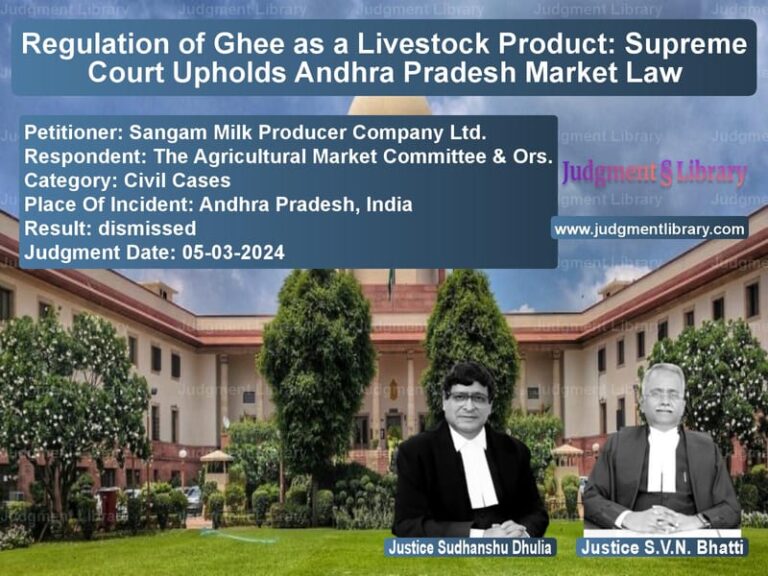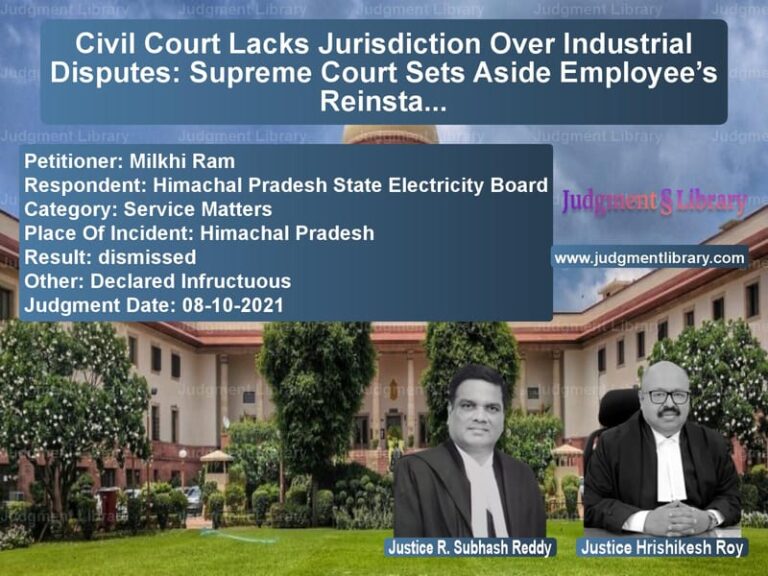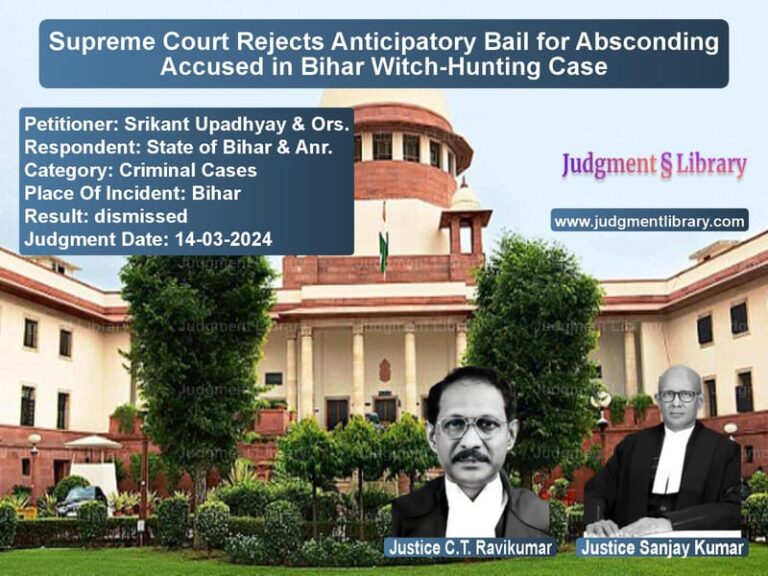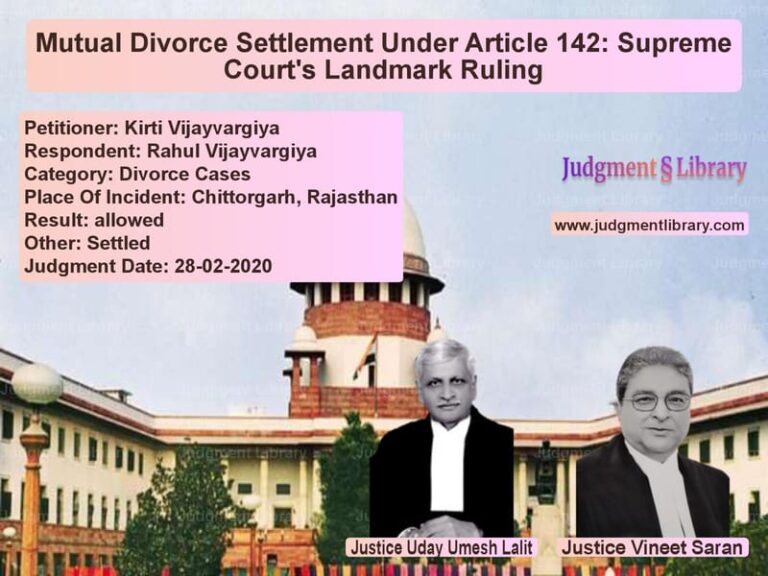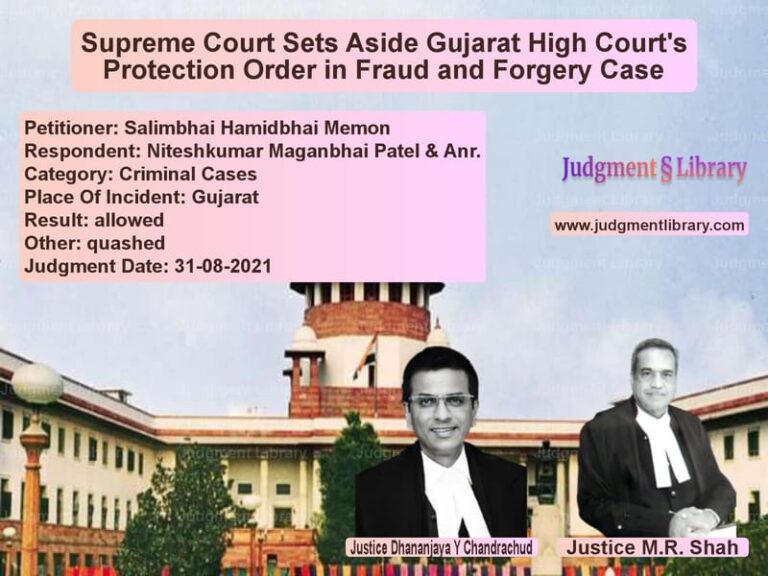Supreme Court Restores Life Imprisonment in Rajasthan Murder Case: Section 149 IPC Reaffirmed
The Supreme Court of India, in Surendra Singh v. State of Rajasthan, delivered a crucial judgment reinstating the conviction of the accused for murder under Section 302 read with Section 149 IPC. The ruling overturns the Rajasthan High Court’s decision, which had set aside the conviction and reduced the charge to a lesser offense under Section 323 IPC. The Supreme Court reaffirmed the significance of unlawful assembly and collective liability in criminal jurisprudence.
Background of the Case
The case originates from an incident on November 28, 2010, when Narendra Singh, the complainant’s younger brother, was attacked while filling water from a hand pump. The accused, including Bhupendra Singh, Vijendra Singh, Bhawani Singh, Sangeeta, and Gulab Kanwar, allegedly assaulted him with lathis. Both Narendra Singh and Bhawani Singh lost consciousness and were taken to a hospital, where Bhawani Singh succumbed to his injuries.
The police registered FIR No. 445/2010 and initially filed a charge sheet against only two accused, Bhupendra Singh and Vijendra Singh. The case went to trial, and Bhupendra Singh passed away during the proceedings. The trial court convicted Vijendra Singh under Section 302/149 IPC and sentenced him to life imprisonment.
However, the Rajasthan High Court partly allowed the appeal, setting aside the conviction under Section 302/149 IPC and reducing the sentence to Section 323 IPC (punishment for voluntarily causing hurt).
Petitioner’s Arguments
The appellant, Surendra Singh, representing the deceased victim’s family, challenged the High Court’s ruling, arguing:
- The High Court erred in disregarding the collective nature of the attack.
- The original FIR specifically named five accused, and all of them were part of an unlawful assembly.
- The High Court incorrectly ruled that the case did not attract Section 149 IPC (common object of unlawful assembly).
- Merely because some accused were tried separately due to absconding does not nullify the unlawful assembly requirement.
Respondent’s Arguments
The accused, Vijendra Singh, defended the High Court’s ruling, stating:
- The fatal blow was inflicted by Bhupendra Singh, who had already passed away.
- There was no pre-planned conspiracy or common object to kill the victim.
- The prosecution failed to establish that the accused knew murder was likely to occur.
- The accused only had a lathi and did not strike a fatal blow.
Key Legal Issues Considered
- Was the accused part of an unlawful assembly?
- Did the High Court err in setting aside the Section 302/149 IPC conviction?
- Was the accused guilty under Section 149 IPC even if he did not personally inflict the fatal blow?
Supreme Court’s Observations
The Supreme Court ruled in favor of the appellant, stating:
- “An assembly of five or more persons acting with a common object is an unlawful assembly under Section 149 IPC.”
- “Even if the fatal blow was inflicted by Bhupendra Singh, all members of the unlawful assembly are equally liable.”
- “The High Court misinterpreted Section 149 IPC by assuming that delayed trials of absconding accused nullify collective liability.”
- “Merely because some accused absconded and were tried separately does not weaken the prosecution’s case.”
The Court relied on precedents, including:
- Bharwad Mepa Dana v. State of Bombay (1960) – Establishing liability for members of an unlawful assembly.
- Mizaji v. State of U.P. (1959) – Holding that knowledge of likely consequences is sufficient for conviction under Section 149 IPC.
Final Judgment
The Supreme Court ruled:
“The appeal is allowed. The Rajasthan High Court’s judgment is set aside. The trial court’s conviction under Section 302/149 IPC is reinstated. The respondent-accused is sentenced to life imprisonment.”
Impact of the Judgment
- Reaffirms collective liability – Section 149 IPC applies even if only one member inflicts a fatal injury.
- Ensures accountability – Members of an unlawful assembly cannot escape liability based on procedural delays.
- Restores justice – The victim’s family secures justice after a prolonged legal battle.
Conclusion
The Supreme Court’s ruling in Surendra Singh v. State of Rajasthan strengthens legal principles governing unlawful assembly and collective liability. It prevents accused individuals from escaping liability due to procedural technicalities and ensures that justice prevails in cases of mob violence.
Petitioner Name: Surendra Singh.Respondent Name: State of Rajasthan & Anr..Judgment By: Justice M. R. Shah, Justice C. T. Ravikumar.Place Of Incident: Jaipur, Rajasthan.Judgment Date: 11-04-2023.
Don’t miss out on the full details! Download the complete judgment in PDF format below and gain valuable insights instantly!
Download Judgment: surendra-singh-vs-state-of-rajasthan-&-supreme-court-of-india-judgment-dated-11-04-2023.pdf
Directly Download Judgment: Directly download this Judgment
See all petitions in Murder Cases
See all petitions in Attempt to Murder Cases
See all petitions in SC/ST Act Case
See all petitions in Judgment by Mukeshkumar Rasikbhai Shah
See all petitions in Judgment by C.T. Ravikumar
See all petitions in allowed
See all petitions in Quashed
See all petitions in supreme court of India judgments April 2023
See all petitions in 2023 judgments
See all posts in Criminal Cases Category
See all allowed petitions in Criminal Cases Category
See all Dismissed petitions in Criminal Cases Category
See all partially allowed petitions in Criminal Cases Category


